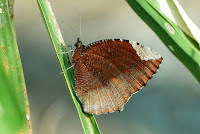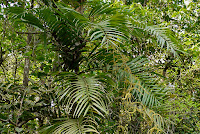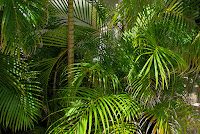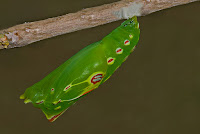<> Elymnias hypermnestra (Linnaeus, 1763) <>
the Common Palmfly ผีเสื้อหนอนมะพร้าวธรรมดา
Click on any photo to see all photos full size in Lightbox
Additions and corrections to the information provided on this page is always welcome. Please use the Contact form.
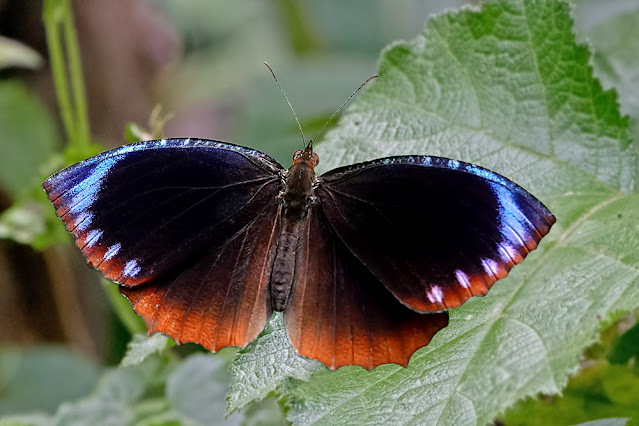
Photo taken at Chiang Dao Wildlife Sanctuary, Chiang Mai, Thailand. ♂ 540m a.s.l.

Elymnias hypermnestra is found in most countries across the region. It is quite a variable species, not only geographically but even within subspecies. This variation is most prominently found in females, with populations in some locations mimicing Danainae and Heliconiinae species. There is much less variation in the males and they are slightly smaller than the female. They are a shade-loving species and are always found in the vicinity of palm trees as these are the only hosts used by the larvae. The adults are very alert and will fly off immediately at the slightest disturbance. Its flies slowly and stops frequently on leaves to rest.
The species is multivoltine with several broods per annum. The adult female lays her eggs singly on the underside of a leaf on the hostplant. The newly hatched larva eats its eggshell as its first meal. In the early stages the larvae are polyphagous and are also known to be cannabalistic. The pupa is initially bright green in colour but becomes very dark before emergence.
Synonyms and previously used names: Papilio hypermnestra, Papilio protogenia, Papilio lais, Elymnias jynx, Elymnias nigrescens, Elymnias meridionalis, Elymnias orphnia, Elymnias undularis, Elymnias obfuscata
Taxonomy: Animalia - Arthropoda - Insecta - Lepidoptera - Nymphalidae - Satyrinae - Elymnias - hypermnestra
Regional subspecies: Elymnias hypermnestra agina (Singapore), E.h. discrepans (W.Malaysia), E.h.hainana (Vietnam, China, Taiwan), E.h.hypermnestra (Indonesia), E.h.meridionalis (Cambodia, S.Vietnam), E.h.nigrescens (E.Malaysia), E.h.undularis (India, Bhutan), E.h.tinctoria (Myanmar, Thailand), E.h.violetta (NE Thailand, Laos)
Regional Distribution: Nepal, Bhutan, India, Bangladesh, Myanmar, Thailand, Laos, Cambodia, Vietnam, China, Taiwan, Malaysia, Singapore, Indonesia
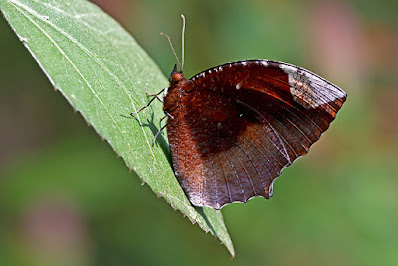 |
| Doi Suthep-Pui National Park, Chiang Mai, Thailand ♂ 450m a.s.l. |
Habitat: Elymnias hypermnestra is found in a wide range of habitats including secondary evergreen and deciduous forest, as long as trees from the Arecaceae (Palmae) family are present. It is also found in scrubland and is often abundant in coconut plantations. It has been recorded up to 1000m a.s.l. but is more often seen at lower altitudes.
Flight time: all year, depending on location Wingspan: 60–70mm
Life History: egg 4 days instar 1 3 days instar 2 4 days instar 3 4 days instar 4 4 days instar 5 4-5 days pupa 6-7 days Total egg to adult 29-31 days
All times are approximate and can vary depending on the season and on the host used.
Larval Hosts: Areca catechu, Areca triandra, Arenga engleri, Arenga pinnata, Arenga wightii, Borassus flabellife, Calamus pseudotenuis, Calamus rotang, Calamus thwaitesii, Caryota mitis, Caryota maxima, Caryota urens, Cocos nucifera, Cyrtostachys renda, Dypsis lutescens, Elaeis guineensis, Licuala grandis, Livistona chinensis, Metroxylon sagu, Phoenix loureiroi, Phoenix pusilla, Phoenix sylvestris, Pinanga tashiroi, Rhapis excelsa, Rhapis humilis, Saribus rotundifolius, Trachycarpus fortunei, (Arecaceae)
Actual host plant used depends upon location and availabilty of plant species.
Adult Food Sources: Nectar - Ziziphus mauritiana (Rhamnaceae), Lantana camara (Verbenaceae). This species is not a regular visitor to flowers but there may be additional flower species that are visited but not yet recorded. Other - mud puddling (occasional), over-ripe fruit (especially ripe fruit of Rhododendron), bird droppings, carrion
 |
| Doi Suthep-Pui National Park, Chiang Mai, Thailand ♂ |
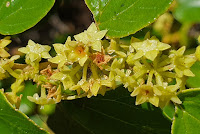 |
| Ziziphus mauritiana, a nectar source |
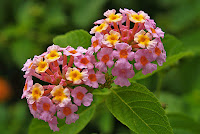 |
| Lantana camara, another nectar source |
Links to other pages in this series for species in the same subfamily

